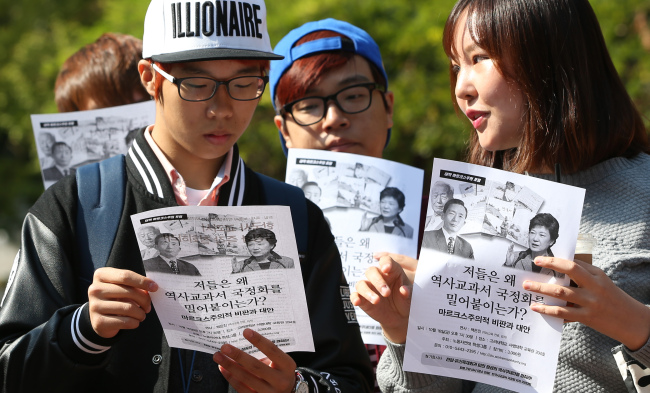The government’s path to reclaiming issuing rights for history textbooks from private publishers entails a myriad of tasks, such as procuring the authors and budget and getting the general education circles to fall in line.
The Education Ministry on Monday announced that it would reinstate government-published history textbooks for secondary education starting in 2017. But history professors from Kyung Hee University on Wednesday announced that they would not participate as authors in the state-published history textbooks.
 |
| 한국사 교과서 국정화 반대 전단지 보는 대학생들 (서울=연합뉴스) 홍해인 기자 = 14일 오후 서울 성북구 안암로 고려대학교 인문사회캠퍼스 내 민주광장에서 이 대학 총학생회 주최로 열린 한국사 교과서 국정화 결정 반대 기자회견에서 이를 지켜보는 학생들이 총학생회 측이 나눠준 전단지를 살펴보며 대화하고 있다. 2015.10.14 hihong@yna.co.kr/2015-10-14 15:12:15/ College students look at a leaflet handed out Wednesday by the student body opposing the government’s decision to reinstate state-authored history textbooks for secondary schools at Korea University in Anam-dong, Seoul. (Yonhap) |
Their announcement is on the coattails of professors from Yonsei University saying they would not “be involved in any way concerning the state history textbooks.” Other major universities including Seoul National University are expected to follow suit as hundreds of professors in history-related departments across the country have criticized the ministry’s plans for state textbooks.
It is widely seen as backlash to the government and ruling Saenuri Party’s claims that the currently privately published textbooks are written in favor of liberals, and that 90 percent of historians in the country are leftists.
Several scholars have raised suspicion that government intervention will result in a textbook that suits the taste of those in power.
“State history textbooks will make history education a tool for politics. I don’t think scholars will be able to participate impartially as authors since the reintroduction of state textbooks is very political in nature,” Chung Yong-wook, a professor of contemporary Korean history at SNU, told local media.
Education Minister Hwang Woo-yea, however, said the ministry has already contacted and made an agreement with several scholars who will participate as authors. Reports have suggested the scholars are seven educators that had a private meeting with Prime Minister Hwang Kyo-ahn and Vice Education Minister Kim Jae-choon last month, five of whom are conservatives that publicly welcomed the state history textbooks.
Kim Jung-bae, the head of the National Institute of Korean History that will be in charge of the history textbooks, said the authors for the state-issued textbooks in the 1970s were more competent than the authors of today.
History textbooks of the 1970s, which were published under former President Park Chung-hee ― whose dictatorial rule spanned across the 1960s and 1970s ― were the original subject of controversy, as they had been accused of whitewashing the Park regime. Its description of the May 16 military coup, through which Park rose to power ― a “revolution that aimed to eradicate corruption and save the country from the threat of political confusion and terrorism” ― is one of the most contentious issues.
Meanwhile, points accused of being “pro-leftist” by the government are expected to be addressed in authoring the new book. The ministry pointed out that the books’ description saying North Korea distributed land to farmers for free after Korea was liberated from Japan could lead to a positive perception of the country.
The ministry also took issue with the use of the term “People’s Army” to refer to the North Korean army, while saying the description that North Korea established a government immediately after the South had conducted a general election could lead to students believing that the governments of the two Koreas are equal. South Korea does not legally recognize the Pyongyang government as a legitimate state.
Portions about founding President Syngman Rhee are also expected to be tweaked. One of the textbooks states that Rhee’s passive approach to punishing those who were pro-Japan during Japan’s 1910-1945 colonialism of Korea was one of the reasons people turned against him. The ministry said that it was overly critical of Rhee.
Securing a 4.4 billion won ($3.8 million) budget for the textbooks is also one of the looming challenges. Persuading the opposition lawmakers who are actively against the notion to sign off on the budget is expected be tough.
The main opposition New Politics Alliance for Democracy has said it will not cooperate in allocating the budget for the textbooks.
Progressive education superintendents across the country, meanwhile, have vowed to author an alternative textbook for Korean history to complement what they suspect will be a lopsided history lesson in favor of conservatives.
“I plan to create selective subjects such as historical philosophy, history and humanities, while allocating a budget to create separate certified textbooks,” said Jang Hui-guk, the education chief for Gwangju and the leader of education superintendent meetings in Korea.
Korean law stipulates that an education chief is entitled to create a supplementary textbook, although it cannot replace the government-approved official textbook.
The Education Ministry said it will pursue legal actions if the superintendent-certified textbooks are politically biased.
Seoul education chief Cho Hi-yeon, who supervises education for the country’s capital and most populous city, has yet to participate in the “supplementary textbook” movement, although he publicly announced his disapproval of the state history textbooks.
An official from the Seoul education office said that the supplementary textbooks are certainly considered an option, but are unlikely to completely replace the state textbooks. “The terminology being used in the media is ‘textbook,’ but it is more like teaching materials that we already use to supplement the classes,” he said.
By Yoon Min-sik
(minsikyoon@heraldcorp.com)



